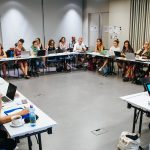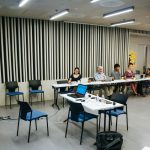Following the great success of the previous two editions of the Music as Heritage course, in 2021 we continue online! Music as Heritage: an Interdisciplinary Approach in Theory and Practice will provide insight into the methodology and approaches of modern musicology as an integral part of heritage studies.
In the 2021 Music as Heritage: an Interdisciplinary Approach in Theory and Practice online summer university course we use music as a tool for analyzing and describing social changes, the interaction of state policies, culture, cultural heritage, and audiences.
The course relies greatly on CEU lecturers and leading scholars in the field, such as Peter Laki from Bard College, Rachel Harris and Angela Impey from SOAS, Jonathan Stock from University College Cork and Martin Stokes from King’s College London.
– The course builds on a highly interdisciplinary academic approach to modern musicology, thus it is open to other fields of study as well. In focus: the many aspects of musical heritage management.
– This summer the course will place its focus on Béla Bartók, one of the most influential composers of the 20th century and one of the forefathers of ethnomusicology today.
– Participants will have the opportunity to develop their individual, cultural heritage related projects under the guidance of our experienced instructors.
– The 7-day intensive summer course requires active participation, daily 4-6 hours, and offers an inspiring, close and friendly atmosphere.
– Implemented on an easy-to-handle, integrated, multifunctional e-learning platform.
Course Directors:
– József Laszlovszky – Cultural Heritage Studies Program/Department of Medieval Studies, Central European University, Budapest, Hungary / Vienna, Austria
– Peter Laki – Bard College, Annandale-On-Hudson, USA
Course Faculty Members:
– Jana Ambrozova – Department of Ethnology and Folkloristics, Constantine the Philosopher University in Nitra, Slovakia
– Gergely Fazekas – Department of Musicology, Liszt Academy, Budapest, Hungary
– Rachel Harris – Department of Music, School of Arts, China Institute, Centre of Contemporary Central Asia & the Caucasus, SOAS University of London, UK
– Angela Impey – Department of Music, SOAS University of London, UK
– András Lelkes – Forum for Folk Art Fund, Budapest, Hungary
– Carolin Müller – Media Center, Technische Universität Dresden, Germany
– Jonathan Stock – School of Film, Music and Theatre, Department of Music, University College Cork, Ireland
– Martin Stokes – Department of Music, King’s College London, UK
– Zsuzsanna Szálka – Cultural Heritage Studies Program (visiting faculty), Central European University, Budapest, Hungary / Vienna, Austria
– Balazs Weyer – Music Hungary, Budapest, Hungary
CEU SUMMER UNIVERSITY
Music as Heritage: An interdisciplinary Approach in Theory and Practice
Online – 28 June – 6 July, 2021
Application for the 2021 course is now closed.
The course is co-organized by Forum for Folk Art Fund, Music Hungary, and the Cultural Heritage Studies Program, CEU, Budapest, Hungary.
Partners: Constantine the Philosopher University in Nitra, Borys Grinchenko Kyiv University, Nouvelle Prague, Pannonica Festival
The project is co-financed by the Open Society University Network, as well as the Governments of Czechia, Hungary, Poland and Slovakia through Visegrad Grants from International Visegrad Fund. The mission of the fund is to advance ideas for sustainable regional cooperation in Central Europe.
FEEDBACK FROM PREVIOUS YEARS
“This course has allowed me to look at my own cultural heritage in an objective way. As a musician who works in both traditional and contemporary fields, I cannot describe the value that this has added onto my professional life.”
“What is special about this programme is that the very best ethnomusicologists, social anthropologists, archaeologists and other social scientists from America, UK, and Central Europe alike, as well as event managers and music practitioners, are all coming together and engaging in intimate formal as well as informal sessions (including trips, dinners, parties, lectures, fieldwork, etc.”




